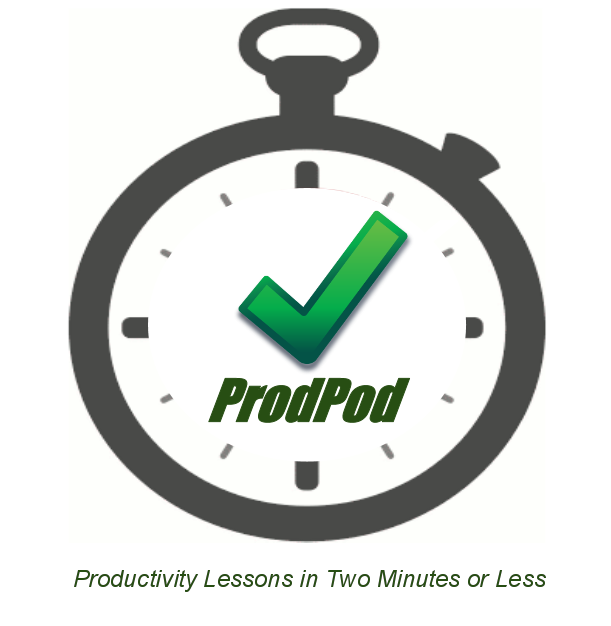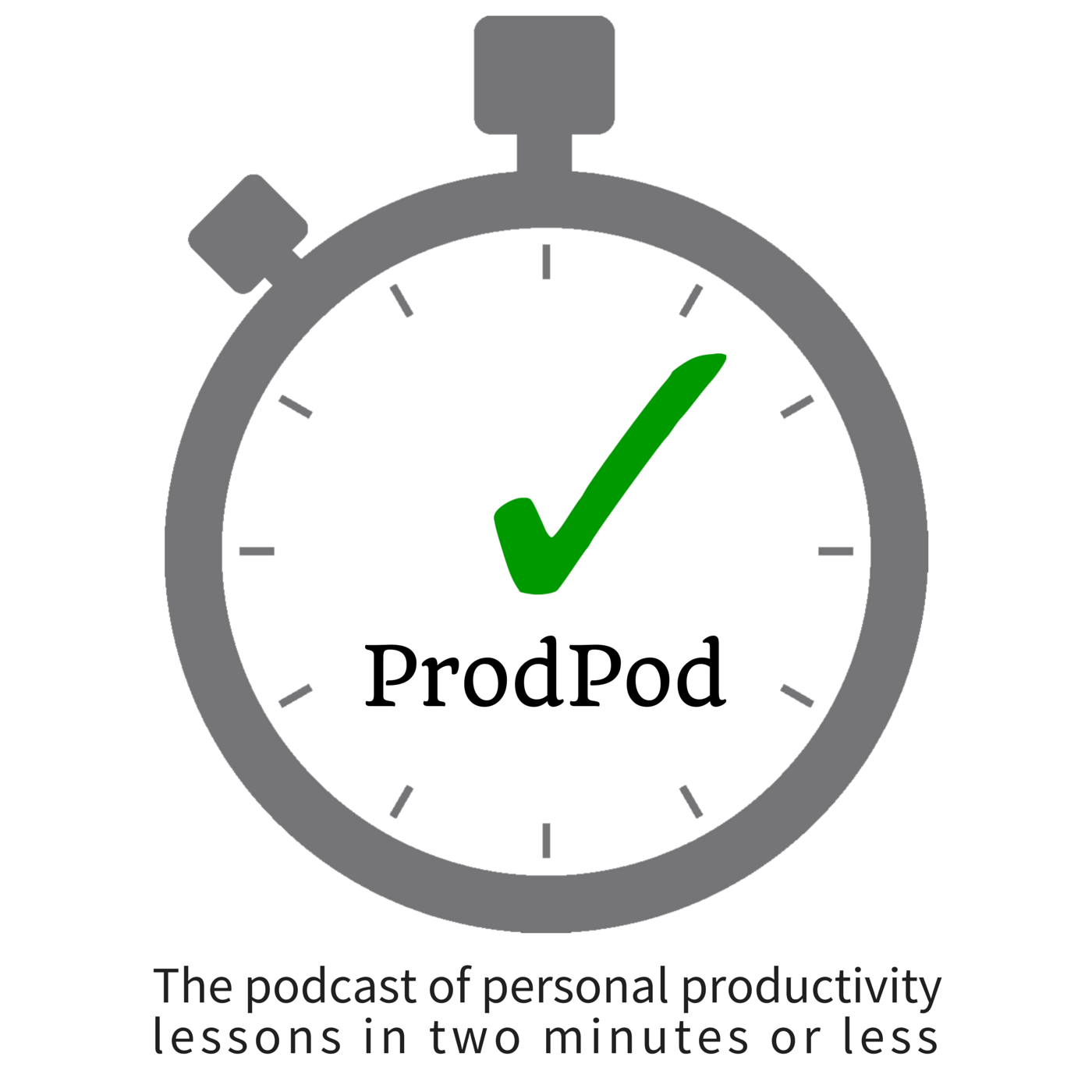Episodes

Tuesday Dec 06, 2011
ProdPod: Episode 26 -- Technology and Simplicity
Tuesday Dec 06, 2011
Tuesday Dec 06, 2011
For those of you who suffer from carrying too much with you on a regular basis, or feeling the clutter of technology accumulate on your desk or around the house over time, think about these three questions to see if you can simplify your technology infrastructure.
1- How often do you use each of the devices you own? Like with your wardrobe, if you haven't worn it this year, it's likely you won't use it next year.
2- Can you consolidate functionality? If you've had a printer, scanner and fax machine sitting around your office or home office for several years, now might be the time to think about consolidating to a wireless, network multi-function printer/scanner/copier and getting a service such as MyFax or eFax that allows you to send/receive faxes by email. This will reduce the devices, clutter and gives you more telecommunications options.
3- Are there new Cloud-based technologies that help you become more device-independent? For example, if you carry a smartphone and an MP3 player, you may want to try out Google Music (the new Web-based music player hosts up to 20,000 of your songs for free so you can access them anywhere) by going to music.google.com and phasing out the extra device.
The beauty of living in an age of advanced technology is that you can also streamline, so why not take advantage!
I HOPE YOU ENJOYED THIS EPISODE OF PRODPOD. THIS IS RAY SIDNEY-SMITH AND THANKS FOR LISTENING! HERE'S TO YOUR PRODUCTIVITY SUCCESS...IN TWO MINUTES OR LESS.

Tuesday Nov 29, 2011
ProdPod: Episode 25 -- Is your system too complex?
Tuesday Nov 29, 2011
Tuesday Nov 29, 2011
Is your system too complex? Well, it is if you spend more time managing your system than your system helps you manage getting things done.
We all have an idea that benefits should be greater than the costs, whether they're tangible or intangible. And, this naturally implies that your developing, implementing and evaluating a productivity system should be outweighed by the amount of time spent actually getting things done.
Said another way, your productivity system should be divided into three areas (as we discussed in episodes 3 and 4 regarding the special theory of productivity): plan, implement and evaluate. For those prone to plan too much or procastinate, planning and evaluating should be contained to about 20% of your time and energy, while implementing (what we call "Doing" in GTD lingo) should be about 80% of your productive time and energy.
This may seem simple, but for many people who are highly interested in productivity, we spend an inexplicable amount of time on lifehack.org, gtdtimes, 43folders and zenhabits, learning about new and innovative topics about productivity and organization, We are actually going beyond the 20% of our time devoted to planning and evaluating instead of the activities that are on our lists. Think about this reality the next time you set aside your focus on getting things done and open up a site that distracts you from being productive. Once you start to be mindful and return to your to-do list, I have no doubt you'll be satisfied that you did!
I HOPE YOU ENJOYED THIS EPISODE OF PRODPOD. THIS IS RAY SIDNEY-SMITH AND THANKS FOR LISTENING! HERE'S TO YOUR PRODUCTIVITY SUCCESS...IN TWO MINUTES OR LESS.

Thursday Nov 24, 2011
ProdPod: Episode 24 -- Thanksgiving and Interdependence
Thursday Nov 24, 2011
Thursday Nov 24, 2011
Every Thanksgiving, I'm reminded about all the wonderful people in my life as my greatest blessing. In our modern, global society, though, it's easy to take many of these important people for granted the rest of the year.
Every Thanksgiving, I'm reminded about all the wonderful people in my life as my greatest blessing. In our modern, global society, though, it's easy to take many things for granted the rest of the year. As way of example, when's the last time you've harvested your own fresh produce or livestock for your family? Even with our deeply interdependent lives, we aren't given many opportunities to highlight the unsung heroes and unseen everyday people who work behind the scenes to make sure our lives are productive.
Interdependence will forever remind me of the words of Dr. Stephen Covey from his 1989 book, The Seven Habits of Highly Effective People. Independent thinking alone is not suited to interdependent reality. Independent people who do not have the maturity to think and act interdependently may be good individual producers, but they won't be good leaders or team players. They're not coming from the paradigm of interdependence necessary to succeed in marriage, family, or organizational reality.
I bid you to be thankful for the great blessing of a productive, interdependent life during this and every Thanksgiving!
I HOPE YOU ENJOYED THIS EPISODE OF PRODPOD. THIS IS RAY SIDNEY-SMITH AND THANKS FOR LISTENING! HERE'S TO YOUR PRODUCTIVITY SUCCESS...IN TWO MINUTES OR LESS.

Tuesday Nov 01, 2011
ProdPod: Episode 23 --
Tuesday Nov 01, 2011
Tuesday Nov 01, 2011
Perseverance is a definite key to success. And, there are opportunities to persevere in everyday life.
"Become a 'possibilitarian.' No matter how dark things seem to be or actually are, raise your sights and see the possibilities-- Always see them, for they are always there." ~Norman Vincent PealeI'd like to invite everyone listening to the podcast to my new live, monthly Twitter conversation, Productivity Chat or prodchat. Please visit productivity.podbean.com to learn more, and see how easy it is to join the conversation!
Perseverance is not the prettiest word. It sounds harsh and dark and sharp. It turns out, though, that to persevere is the one characteristic unique among all successful people. Whether it's in love, a kid's soccer game or corporate America, the fact that you didn't give up is the key for moving beyond the short-term wins and losses and onto the greater goal. I started to think about my own life and how I could think about perseverance vis-a-vis my productivity. I persevere when I don't feel like working anymore for the day and I do that *one more item* on my Next Actions list that doesn't take much energy. I persevere when I decide to dive into a large project by doing just the next thing (e.g., that first phone call, email or the first sentence of a vision/mission statement) and then decide to continue on with the next action on that project. In what ways do you persevere every day?
I encourage you to think about these possibilities to persevere whenever you can, every day. There are opportunities to overcome challenges, competing priorities, and take advantage of openings in your schedule throughout the day to greater productivity.
"Become a 'possibilitarian.' No matter how dark things seem to be or actually are, raise your sights and see the possibilities-- Always see them, for they are always there." ~Norman Vincent Peale
I'd like to invite everyone listening to the podcast to my new live, monthly Twitter conversation, Productivity Chat or prodchat. Please visit productivity.podbean.com to learn more, and see how easy it is to join the conversation!
I HOPE YOU ENJOYED THIS EPISODE OF PRODPOD. THIS IS RAY SIDNEY-SMITH AND THANKS FOR LISTENING! HERE'S TO YOUR PRODUCTIVITY SUCCESS...IN TWO MINUTES OR LESS.

Tuesday Oct 25, 2011
ProdPod: Episode 22 -- Defining procrastination
Tuesday Oct 25, 2011
Tuesday Oct 25, 2011
Sometimes, it's all in how you define an unproductive behavior that starts to build new, productive behaviors. I'd like to invite everyone listening to the podcast to my new live, monthly Twitter conversation, Productivity Chat or prodchat. Please visit productivity.podbean.com to learn more, and see how easy it is to join the conversation!
The first accepted definition is procrastination being a lack of motivation leading to non-action. The second common definition of procrastination is the putting off till tomorrow what you can do today. The third, lesser known and my personally-accepted definition, is the doing of lesser-priority activities instead of doing higher-priority activities. Therefore, procrastination is a supplanting of activities, delaying activities of higher importance as a by-product; not laziness, not lack of motivation, and not lacking in self-efficacy.
Normally I would say that asking yourself why you're thinking a particular way would be the first step to conquering any unproductive behavior; however, this is an exception to that as I think you shouldn't think one more minute about why you procrastinate and stop defining procrastination as a character trait. Banish the term "procrastinator" and the statement "I'm a procrastinator" from your vernacular. It's a behavior and behaviors can change by building new, productive behaviors.
Heck, procrastination can be positive; for example, doing a high priority activity when the right energy, emotion or competence is not available can be detrimental. Doing the lower-priority activities during those times can be the best use of your time.
I'll have many more episodes on conquering and finding balance with procrastination, and I wanted to set a good definition in place for the context of managing procrastination and, ultimately, your productivity.

